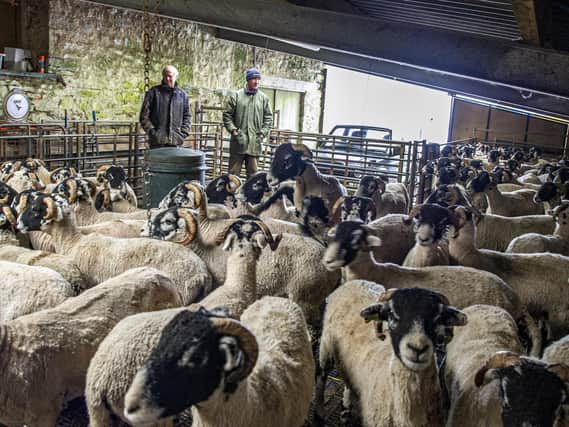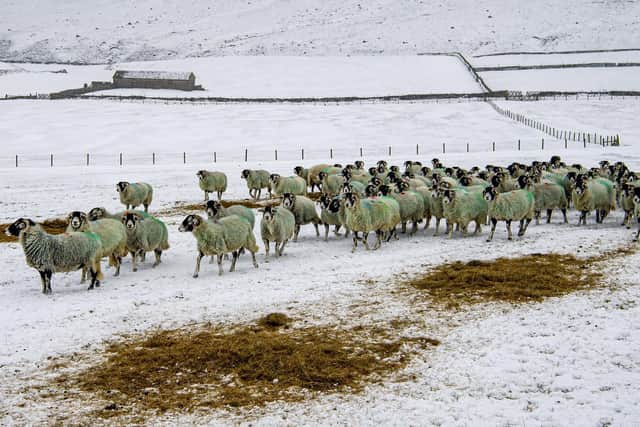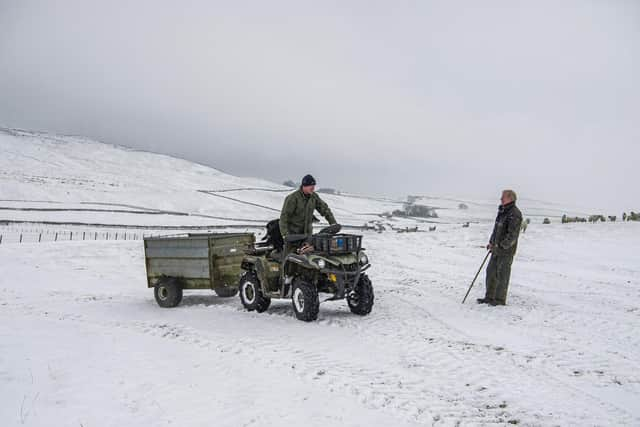Farm of the Week: The Swaledale breeders on Malham Moor who supply Marks & Spencer with lamb


“All I ever wanted to be was a farmer and to have Swaledale sheep,” said Bill, whose farmland runs to around 812 acres of rough grazing between 1,200-2,000ft and features limestone land and peat with his nearest neighbour a mile and a half from his farmhouse.
“They were bred in me through my grandfather Edmund, my father John, uncle Robbie, cousin Robert and my brother John. Every one of my 500 pure Swaledale breeding ewes we have today started from the first ewe I was given by my grandfather when I was a toddler.”
Advertisement
Hide AdAdvertisement
Hide AdThe Swaledale and other hill breeds have long been the starting base for the UK’s lamb meat production line that sees crossing with other breeds such as the Bluefaced Leicester and then the Texel to produce much of the lamb purchased in butcher’s shops.


But Bill and 11 fellow producers began changing this mindset and promoting the consumption of Swaledale lamb ten years ago when they agreed a deal to supply Marks & Spencer.
“When the idea of supplying Marks & Spencer was first mooted there were 12 of us who took it up. They were keen to support native hill breeds that play their part in the environment and saw the Swaledale as the quality name that fitted well with what they were trying to do,” said Bill.
“We gave ourselves the name The Dirty Dozen, after the film, nothing else.”
Advertisement
Hide AdAdvertisement
Hide AdThe venture has been so successful that having started by supplying 1,764 lambs in 2011 over 12,000 were supplied from 46 producers last year.


Bill said: “Marks & Spencer want a continuous, steady and consistent supply of quality lamb from January 1 to April 30 each year. The numbers they are now taking has shown that the demand is there and that what we produce is of excellent quality on the plate, just as much as it is on the hill.”
Bill’s sheep enterprise, run with one of his three sons Robert, sees his 500 breeding ewes producing around 800 lambs a year from April 10 through to the end of May.
“Around 170 of our ewe lambs are kept as flock replacements with about 230 being sold as surplus gimmer lambs to other flocks in the autumn sales,” said Bill.
Advertisement
Hide AdAdvertisement
Hide Ad“We select the best 15 of our ram lambs to take to the annual Swaledale Sheep Breeders Association ram sales and around 300 ram lambs go to the Marks & Spencer scheme when it starts in January. Any that have made around 50 kilos before then from November go to St Merryn Meats.”
Bill and Robert also buy in around 200 store lambs for winter, but it is their reputation for producing homegrown, excellent pure Swaledale stock that is known far and wide through the breed and has led to fabulous results at Kirkby Stephen livestock market, no more so than last year when they achieved a best price of £14,000 for one of their tups.
“We’ve had others at £10,000 and £12,000 a few times, but the 2020 sale was a new high,” said Bill.
“We have purchased as high as £17,000 and once £30,000 as a half share in one. I try to buy as good quality, if not better, than I sell and I also try to buy from different people, otherwise you can soon run into trouble with your breeding.”
Advertisement
Hide AdAdvertisement
Hide AdBill’s family moved from Mallerstang near Kirkby Stephen to Stockdale Farm, three miles out of Settle, when he was just three years old. His father took over a farm at nearby Eldroth when he was 12 and the young Bill went to Giggleswick School where TV presenter Russell Harty was an English teacher.
“My mother Margaret arranged extra tuition in English and Maths for me to get a job out of farming. But it didn’t work. Farming was all I wanted, and I worked on a farm near Kendal, High Foulshaw Farm in Levens, for four years from being 17.”
It was a 12-month stint working in Settle coal yard in 1973 following the farm job in Kendal that brought about what was to become the future Bill had always hoped for.
“I delivered coal to farmer Bill Bland in Kirkby Malham who was a great enthusiast for young farmers. He offered me a job working for him on his dairy and sheep farm.”
Advertisement
Hide AdAdvertisement
Hide AdIt was the break Bill needed. He looked after Bill Bland’s young stock from his pedigree British Friesians and tended his flock of Swaledales that bred North of England Mules. Bill had such belief in the Swaledale breed that he convinced his employer to move towards keeping a small percentage pure rather than crossing them.
“I persuaded him and because Bill was very good at letting young people have their head, he allowed me. He let me keep some of my own. I stayed with him until I was 28 and had 35 pure Swaledale breeding ewes by the time I applied for the tenancy here at Tennant Gill.”
Having initially purchased 400 sheep from the previous farmer at Tennant Gill, Mason Hodgson at a farm sale, Bill set about crossing those with the Bluefaced Leicester and eventually selling them while he built up his pure Swaledale flock from his own breeding ewes he had brought from Bill Bland’s farm at Kirkby Malham.
Cattle are the other livestock at Tennant Gill. Bill and Robert have a suckler herd of 37 cows, predominantly Limousin cross put to a British Blue bull with a few Salers and Herefords.
Advertisement
Hide AdAdvertisement
Hide Ad“We buy heifers locally and send stock fat to Skipton livestock market at between 14-20 months. Calving is normally in July but the Salers we’ve bought more recently are due to calve in January and February this year.”
Bill also won an eco-farming award through Marks & Spencer for farming in sympathy with his environment by harnessing natural resources to maintain a sustainable farming business. Tennant Gill Farm relies on solar power and hydro electricity production.
Comment Guidelines
National World encourages reader discussion on our stories. User feedback, insights and back-and-forth exchanges add a rich layer of context to reporting. Please review our Community Guidelines before commenting.